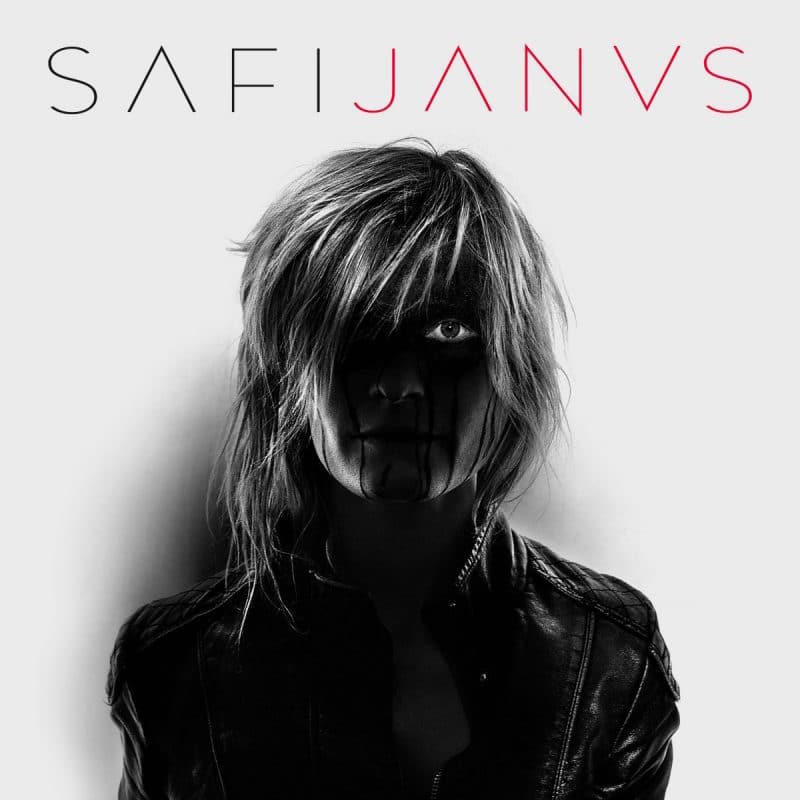SAFI is a musician and eponym of the same-named band; the band’s work can be identified somewhere between punk and poetry. After a graphic design education in Halle and Leipzig, and various jobs in that area, SAFI’s dream to become a full time musician became more urgent and she decided to concentrate on that genre while continuing to work as a graphic designer.
Because of her concerts and meetings with clients far away from her hometown of Berlin, she told us that to “work on the fly” is one part of the creative process. “When working on the road my concentration is the best. Probably because I have limited time and nothing can distract me. For sure my focus is better than if I was working in the studio for several days. For the whole time one has an observer’s perspective. One consumes influences and has a look out of the window or examines people. Especially that situation, to be trapped in a room that I can’t leave instantly, inspires me to create. For me, that window is like looking at a collage [of different people, scenery, events].” Therefore it’s obvious, to not only perceive those impressions, but to use them for my own work.
“I’m always collecting impressions – no matter where I am. I’m collecting through audio recordings or sketch books. In sketchbooks I am writing fragments of sentences and when I’m experimenting with audios on the computer – I’m putting together traces, taking them apart again and saving them within other archives: Sound Collage.”
SAFI described putting all those fragments together, as a whole, like this: “I treat text and music like a sculpture, I summarize and take away again, until I can find the form. At the moment the basis for a piece is the sound, the music, the rhythm, the melody. The text comes later – but sometimes it is the other way around.“ SAFI isn’t afraid of connecting her creative work with her education: “to me it’s kind of a painting; a compression and a process until the verdict that it is good enough and even after listening to it for the seventh time it still exists.” For SAFI, songs only survive if they are allowed to mature. “Generally I take time to leave pieces alone for a while. That creates the necessary distance to evaluate a piece in its being. With a fresh ear you are in the position of an aerial perspective and you realise immediately where it snags and is inconsistent, whether the piece really has a meaning, if the idea has manifested and whether the piece is relevant. Every second, every little shred can give rise to a new song.To me, every millimeter of writing on paper contains the potential to develop a story. The main inspiration is a playful approach: to liberate oneself, establish new rules, and to break them again; the passion to play and to create. The happiness is the main inspiration and motivating force. The next step is the aspiration: Where to go? What should it look like? What purpose does it all have?”
Contact with other artists plays a big role in the musician’s life, even if that can be painful from time to time. “It’s an amazing thing to work together with people from different genres. […] Together there is a creative process again. There, the songs are still able to change, they can get another character. If I notice that suddenly something weird happens with Matthias on the second guitar or Frank at the drums and we try to save that moment: ‘play this continuously and we improvise various things.’ Or they might say: ‘SAFI, that’s impossible to play, we can’t do it like that. What do you think about me playing it like this?’ Like that it’s amazing as well.”

For SAFI, even after several iterative loops the work isn’t done. “The reaction of the audience shows how well you’re able to perform the song. It is about the direct dialogue. If I played music just by myself, I would probably be very lonely. If people come to concerts and listen and understand, something magical happens. Everything has a purpose. It is being examined at its heart, screened by the audience, it is being absorbed, celebrated, or misunderstood – the whole work happens in that moment. It all becomes one.”
To share music or art, whether on a stage or in public, always means to be judged by people and to be confronted with critique. “Generally we think it is important that critique happens. The most instantaneous reaction we get is at concerts. On the one hand, the immediate reaction, the more or less strong applause during the concert, but also after the performance. Afterwards we get to talk to people at the merchandise stand: they buy things, ask questions, or share their excitement, but also their critique. Our friends and colleagues also share their compliments and critique with us. That feedback is more intense because our work really gets challenged or positively evaluated.”
It is important to SAFI to share the songs with the people she trusts and whose critique helps it to evolve. And she thinks, that it is important to, “not show her music to too many people, only to a small circle because otherwise there would be too many opinions. I am the most happy, when people say that I gave them something: they can take something home with them and think about it.”
SAFI also thinks that the artistic and creative influence of all kinds of genres contributes to our economy and improves our environment, that every person can be creative. “I noted, that everyone, even if he’s as far from the art as possible is creative because he decides about his own life and likes the things that he likes, otherwise he wouldn’t do them.
Project ideas emerge out of a creative impulse or will. If someone wants to hire one or one hundred employees, or how someone paints his own picture or dream is creative to me. The process is able to be designed. I would probably advise the managing partner of a collection agency to talk to creative people more often and to go to exhibitions and concerts. Additionally, we should have dialogues concerning idealistic and philosophical topics, so that the perspective is able to change and new opportunities arise.”
The full interview with SAFI in German language
Info
Text by Adina Asbeck.
Edited by Stephanie Barnes.
The interview was conducted by Dirk Dobiéy on 11/11/2015.
Image source: SAFI/ Stephanie von Becker.
